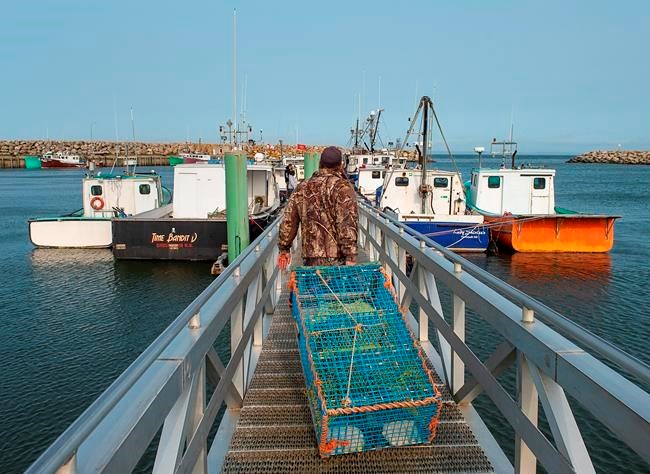HALIFAX — Indigenous chiefs in Nova Scotia are calling on the federal government to denounce what they described as racism and violence directed towards the Mi'kmaq people following a weekend of tension in St. Marys Bay.
Nova Scotia Mi'kmaq chiefs met with Fisheries Minister Bernadette Jordan and with Indigenous Relations Minister Carolyn Bennett Monday morning, a day after a flotilla of non-Indigenous fishermen removed about 350 lobster traps off the coast of southwestern Nova Scotia.
"Non-Indigenous fishers and citizens are putting the safety of our people at risk," Chief Terrance Paul said in a statement following the meeting.
The federal government and the RCMP, he said, "must address the harassment and illegal activities taken against our people and they must enforce and charge those who to are cutting and stealing our traps, shooting flares at our boats, and threatening the lives of our people."
The chiefs said they told the fisheries department the seized traps must be returned to Indigenous harvesters. Minister Jordan did not respond to a request for comment Monday.
Sipekne'katik First Nation say its people have a treaty right to fish at any time. Non-Indigenous fishermen say the First Nation is illegally fishing off-season.
A 1999 Supreme Court decision affirms the treaty rights of Mi'kmaq people to fish for a "moderate livelihood." Rhonda Knockwood, director of operations for Sipekne'katik First Nation, said the federal government needs to clearly define the treaty rights of the Mi'kmaq people to earn a living off fishing.
She said the tensions between the two groups is a culmination of years of frustration with the Department of Fisheries and Oceans and its "deliberate dithering and underhanded tactics surrounding the negotiations to define a moderate livelihood and implementation of the treaties."
Knockwood said since the traps were taken Sunday, the First Nation's lobster harvest was too small to present to buyers. "It's not even worth selling," she said in an interview Monday. "We're just consuming it as our food in ceremony now."
Colin Sproul, president of the Bay of Fundy Inshore Fishermen's Association, said the action taken Sunday by the non-Indigenous fishermen was necessary to remove the "illegal" traps. He said the lobster-fishing season in St. Marys Bay doesn't start until the last Monday of November every year.
Lobster fishing in the area is closed from May 31 until late November, Sproul explained in an interview Monday, to allow the crustaceans to safely mate during their reproductive period, as the lobsters' shells moult and soften during this time.
Sproul said Sunday's flotilla removed the gear unmolested under the watch of RCMP, coast guard boats and police helicopters.
"The gear that we were collecting was what was in violation of the law," Sproul said. "There's nothing more to show that fishermen have the true, just, lawful position here than the fact that we conducted that activity yesterday and nobody stopped us."
He said his association respects Indigenous treaty rights but it doesn't think it's appropriate to fish off-season in a nursery ground such as St. Marys bay.
Paul, however, said Indigenous treaty rights exist alongside the rules set out by the federal government. "The public may not comprehend a fishery outside the realm of the Department of Fisheries and Oceans, that does not make our fishery illegal."
"We called on Canada to help educate the public on the truth and to address the systemic racism that has been a major part in denying our ability to exercise our rights."
On Monday, Nova Scotia Premier Stephen McNeil said in a statement that the province recognizes the treaty rights of the Mi'kmaq First Nation but he admitted "many of the details surrounding the nature and extent of those rights are not clear."
Clarification, he said, "is best addressed through open and respectful dialogue."
This report by The Canadian Press was first published Sept. 21, 2020.
- - -
This story was produced with the financial assistance of the Facebook and Canadian Press News Fellowship.
Danielle Edwards, The Canadian Press



